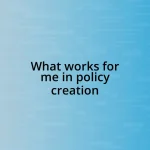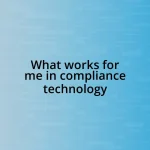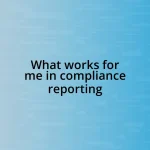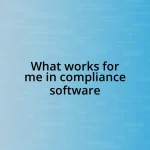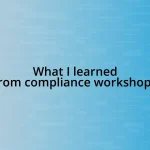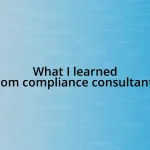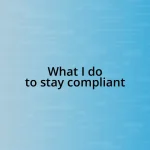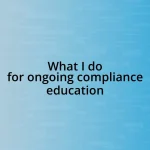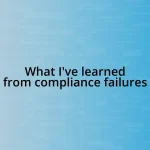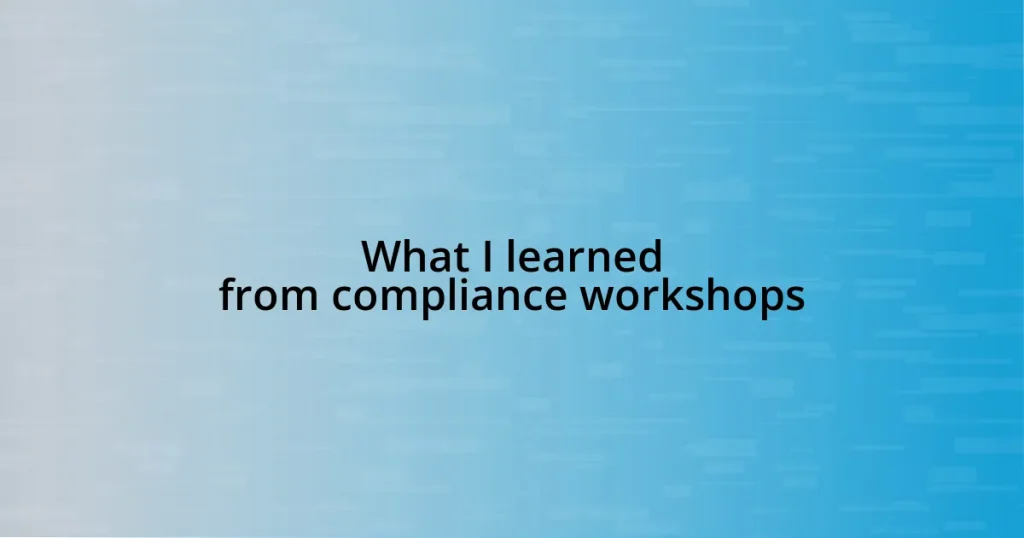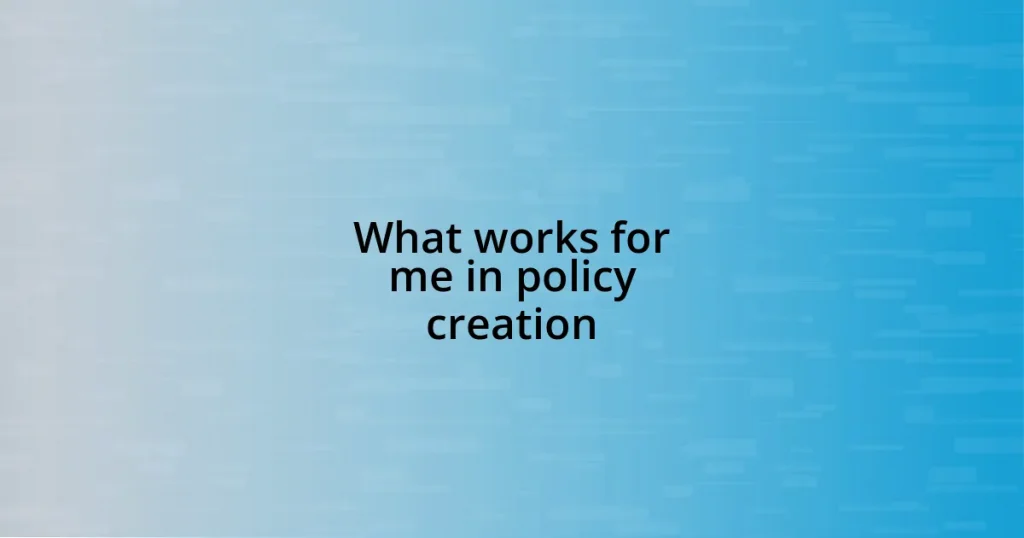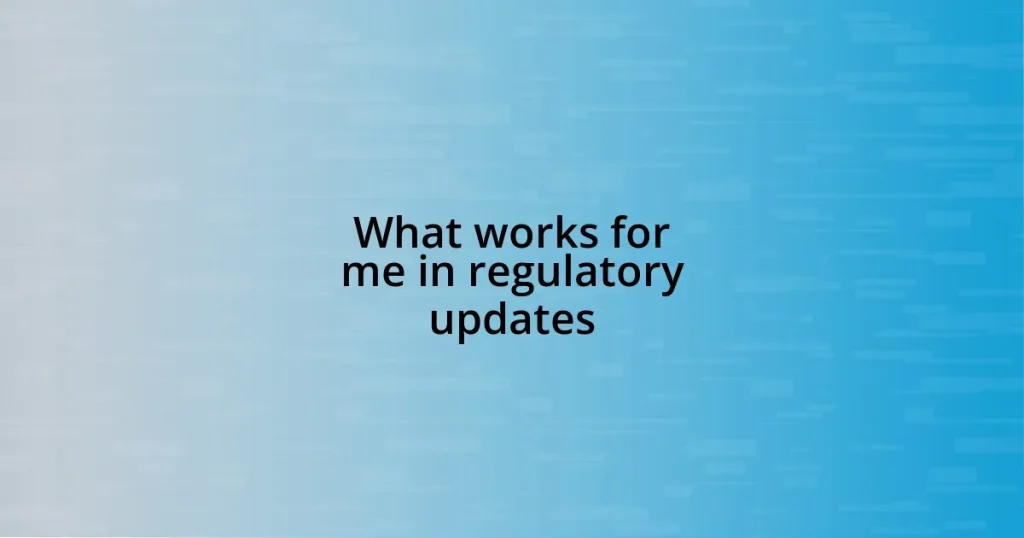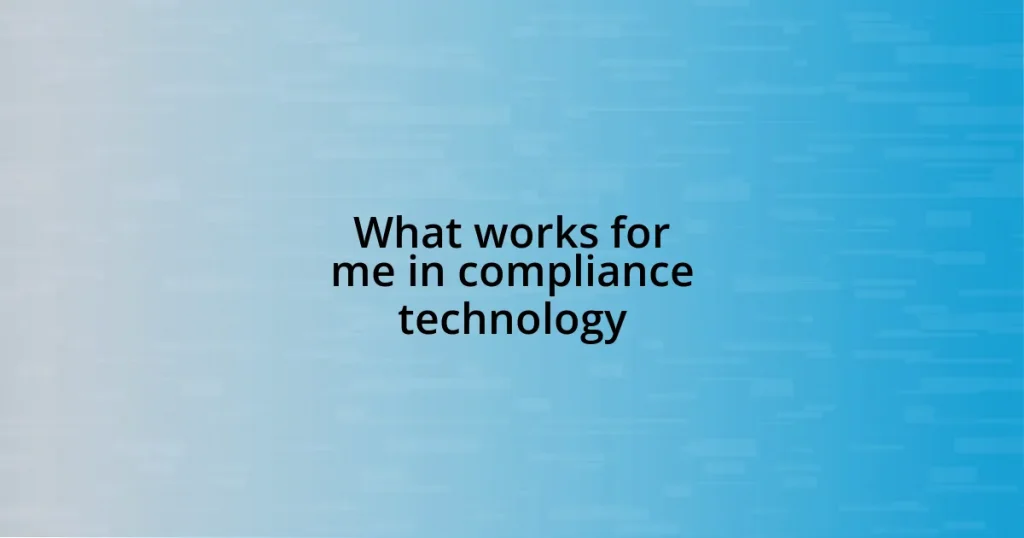Key takeaways:
- Compliance workshops enhance understanding of complex regulations, fostering engagement and team cohesion.
- Key topics include data protection, anti-bribery laws, and ethical decision-making, which promote real-world application.
- Digital learning platforms and real-time data analytics are shaping the future of compliance education, making training more interactive and accessible.
- Networking opportunities during workshops build community and illustrate the interconnected nature of compliance across departments.
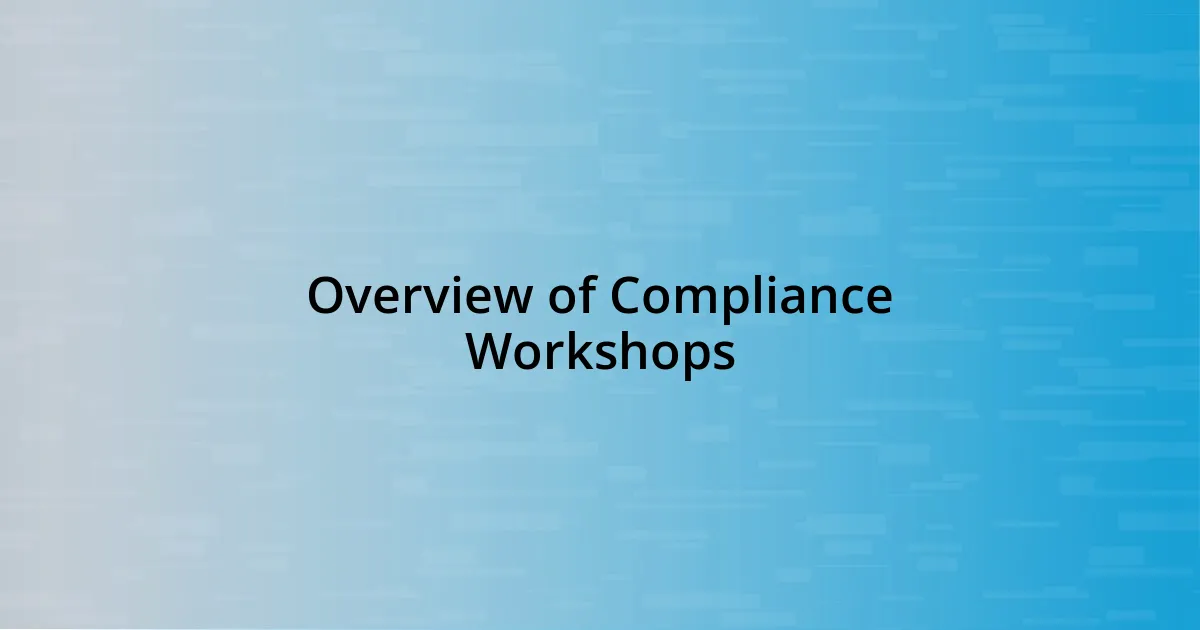
Overview of Compliance Workshops
Compliance workshops are designed to educate employees about regulatory requirements and organizational policies. I remember attending my first workshop and feeling overwhelmed by the sheer volume of information—who knew compliance could be such a complex web of rules? But honestly, those initial feelings of confusion quickly turned into clarity as I realized how these sessions are crucial for protecting the organization and ensuring we all understand our responsibilities.
Typically, these workshops cover various topics, from data protection and anti-bribery laws to ethical decision-making in the workplace. I often found myself intrigued by the real-life scenarios presented, where we were asked to analyze compliance dilemmas. It prompted me to think, “What would I do in that situation?” This engagement opened my eyes to the practical applications of what we were learning, allowing me to connect the dots between theory and practice.
Each workshop is an opportunity not just to learn but to engage in discussions that can shape our workplace culture. I felt a sense of camaraderie as colleagues shared their experiences, sparking dialogues about challenges and best practices in compliance. Have you ever thought about how fostering such a shared understanding can lead to a more ethically-aware team? I genuinely believe these workshops are more than just educational—they’re a step towards building trust and accountability within our organizations.
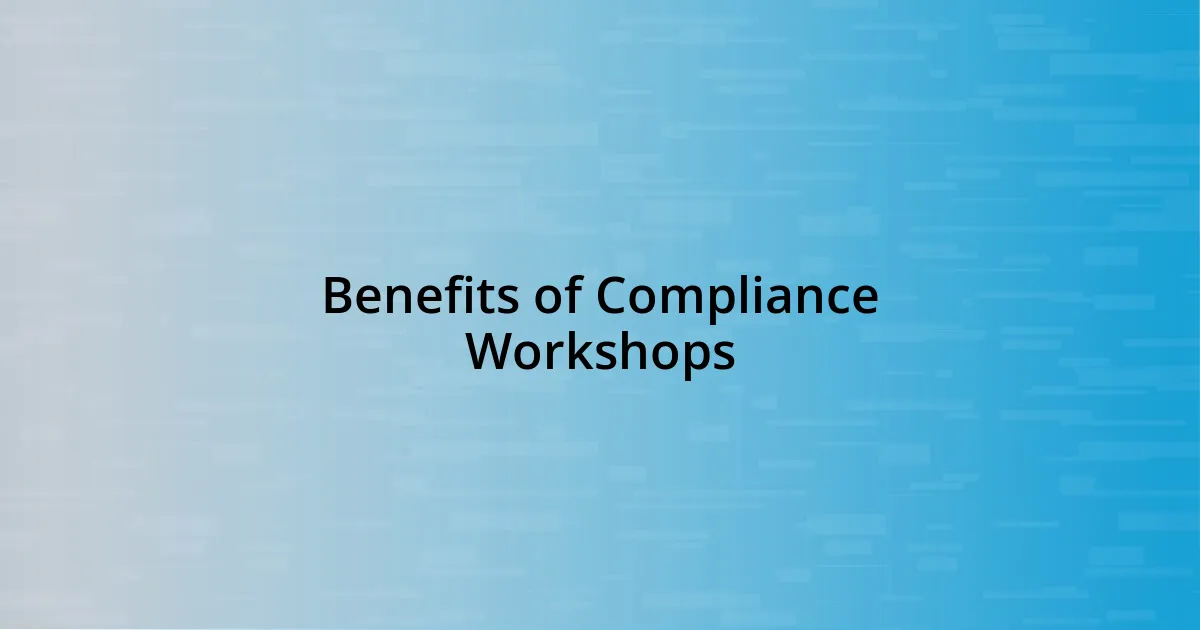
Benefits of Compliance Workshops
Participation in compliance workshops brings clarity to regulatory concepts that often seem daunting. For instance, during a recent workshop, I came across a scenario involving financial reporting. Initially, it felt like deciphering a foreign language, but as the facilitator broke it down, I realized how critical these principles are for maintaining transparency. This newfound understanding has empowered me to approach compliance not as a box to check, but as an integral part of our operations that I genuinely care about.
Another significant benefit of these workshops is the networking opportunity they provide. I vividly recall a breakout session where I met colleagues from different departments. We exchanged insights on how compliance impacts our varied roles. This interaction helped me appreciate that compliance isn’t just an isolated function; it intertwines with every aspect of our organization. Making these connections has not only broadened my perspective but also fostered a sense of community. Have you had a similar experience of discovering how interconnected our roles truly are?
Lastly, compliance workshops highlight the importance of ongoing education in an ever-evolving regulatory landscape. One workshop focused on recent changes in data protection laws, and I felt inspired to stay proactive and informed. The facilitator emphasized continuous learning, which resonated with me deeply. I’ve since taken it upon myself to seek out additional resources and trainings. This commitment not only benefits me but also strengthens our team’s collective compliance knowledge.
| Benefit | Description |
|---|---|
| Clarity in Understanding | Workshops simplify complex regulations, making them accessible and applicable. |
| Networking Opportunities | Attendees connect and learn from one another, fostering collaboration across departments. |
| Emphasis on Continuous Learning | Regular updates on regulations keep employees informed and engaged. |

Key Topics Covered in Workshops
In my experience, the key topics discussed in compliance workshops are truly eye-opening. I remember attending a session focused on data protection, where we explored real-world breaches that led to severe consequences. Hearing those stories made me acutely aware of the risks we face daily, igniting a motivation within me to be an advocate for strong data practices in my team.
Here’s a quick overview of the essential topics:
- Data Protection: Understanding legal requirements and best practices to safeguard sensitive information.
- Anti-Bribery Laws: Learning about the implications and consequences of unethical practices.
- Ethical Decision-Making: Engaging in discussions about real-world dilemmas to develop critical thinking skills.
- Regulatory Updates: Staying current with changes in laws and regulations affecting our industry.
- Reporting Mechanisms: Familiarizing ourselves with the processes for reporting compliance issues or concerns.
These workshops not only cover essential content; they also foster an environment where we can safely share our thoughts and experiences. I vividly recall a breakout group discussing ethical decision-making. At one point, I brought up a dilemma I faced, and the response from my colleagues was incredibly supportive. It struck me just how crucial these conversations can be for building a culture of openness and trust.
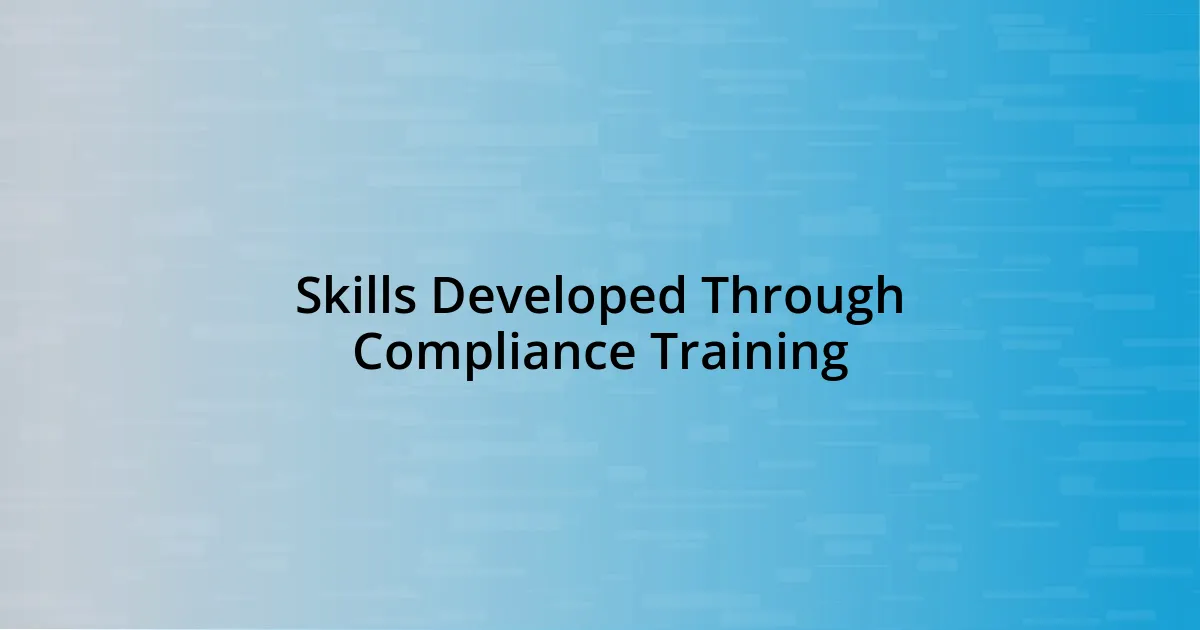
Skills Developed Through Compliance Training
Through compliance training, I honed my analytical skills significantly. One memorable instance was when we tackled a complex case study about regulatory failures within a major corporation. I found myself dissecting it, analyzing what went wrong and identifying warning signs. This experience taught me not only to think critically but also to anticipate potential compliance issues before they spiral out of control.
Another skill I developed is effective communication. During role-playing exercises, I had to articulate compliance policies clearly to different stakeholders, from team members to senior management. I remember feeling nervous at first, but as I practiced, I could see how vital it is to convey complex information simply and effectively. Have you ever had to explain a complicated topic in layman’s terms? I learned that this skill can bridge gaps and foster a more compliant workplace culture.
I also became adept at problem-solving through collaborative discussions. In one workshop session, we worked in teams to devise strategies for hypothetical compliance challenges. I vividly recall the buzz of brainstorming ideas and how each person’s input shaped our final solution. It struck me then that teamwork in compliance isn’t just beneficial; it’s essential for creating comprehensive solutions to multifaceted problems. This experience made me appreciate diverse perspectives and the power of collective creativity.
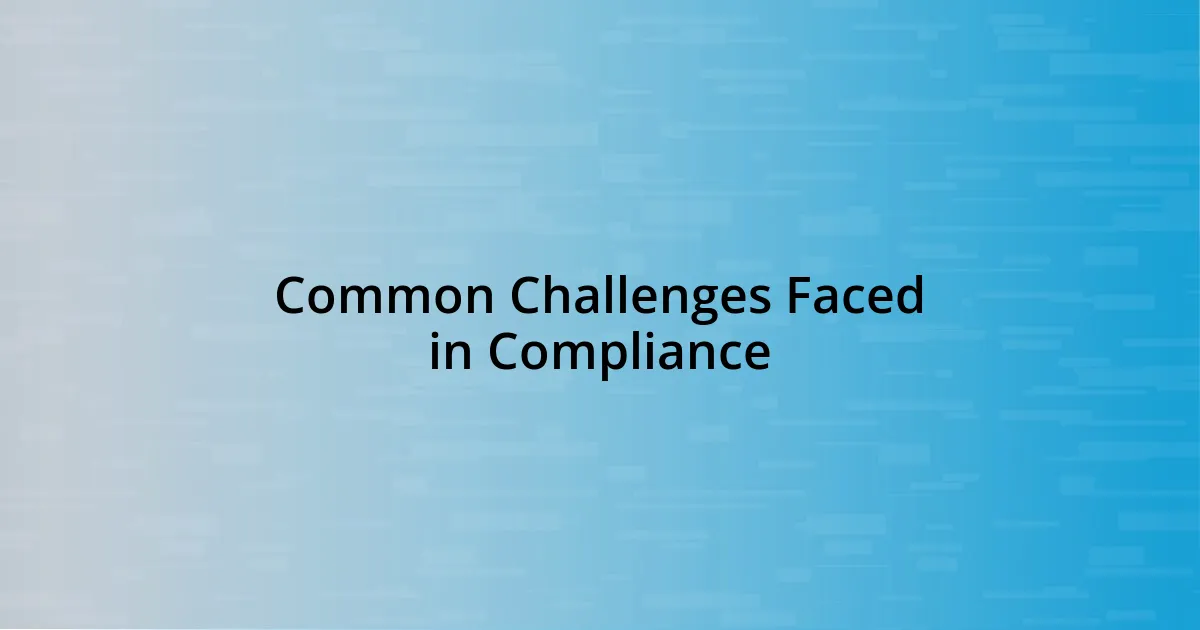
Common Challenges Faced in Compliance
Navigating the labyrinth of compliance can be daunting. One challenge I came across during a workshop was the ever-shifting landscape of regulations. I remember a specific moment when a facilitator presented a recent regulatory update that completely altered how we perceived our compliance obligations. It struck me how easily organizations could become outdated without a proactive approach to continuous learning. Have you ever felt that urgency in your own workplace, where yesterday’s practices just won’t cut it anymore?
Another hurdle often discussed is the cultural resistance within organizations. During a group activity, several participants shared instances where they encountered pushback from colleagues when trying to implement compliance measures. I had my own experience with this. When I proposed a new data protection protocol, the initial reaction was skepticism. It made me realize that advocating for compliance isn’t just about understanding the rules; it requires a change management strategy to engage everyone effectively.
Finally, the challenge of resource allocation can’t be overlooked. In one session, we analyzed case studies of companies that faced penalties due to insufficient compliance budgets. I recall participating in a lively debate about prioritizing compliance initiatives over other operational costs. It was thought-provoking to consider how often compliance takes a back seat to immediate business needs. How often do we see organizations struggle to balance compliance with their bottom line? This discussion highlighted the vital need for leadership to understand that investing in compliance is not merely a cost; it’s a fundamental enabler for sustainable success.
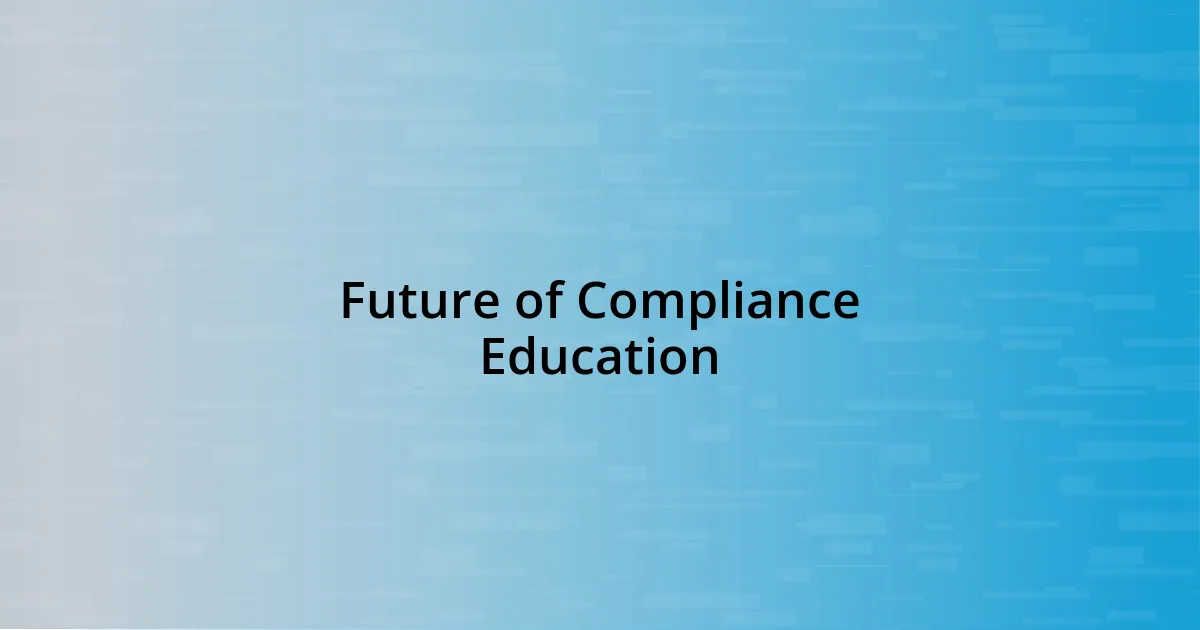
Future of Compliance Education
As I look ahead to the future of compliance education, I can’t help but feel a mix of excitement and anticipation. Digital learning platforms are not just on the rise; they’re transforming how we approach compliance training. I remember attending a virtual workshop that effectively utilized interactive modules and gamification. It made the learning process feel less like a chore and more like an engaging challenge. Have you ever found yourself more focused in an online setting due to its dynamic nature? I truly believe this approach will become the norm, making compliance education more accessible to a wider audience.
Another key trend I foresee is the integration of real-time data analytics into compliance training. I recall how one workshop involved analyzing data to identify compliance patterns. It dawned on me that future programs could leverage live data, allowing participants to react and adapt in real time. Imagine learning to pivot strategies based on current compliance metrics! This kind of proactive learning could not only enhance knowledge retention but also equip individuals with the tools to handle emerging compliance challenges confidently.
Collaboration across different sectors is also essential for the evolution of compliance education. During a meet-up, I engaged with professionals from various industries, and it was incredible to discover the overlapping compliance concerns we all faced. Sharing insights with others not only broadened my perspective but fostered a mutual understanding of compliance as a collective responsibility. How often do we limit ourselves to our own industry bubble? I think the future lies in pooling our experiences and resources, creating a richer, more diverse educational landscape that benefits everyone involved.

